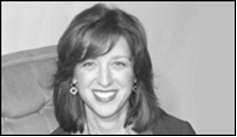
BIOGRAPHY
Sherri Hope Culver is Associate Director of the Media Education Lab at Temple University and on the adjunct faculty at Temple University . She served as General Manager of WYBE Public Television in Philadelphia , as an executive with New Jersey Public Broadcasting and as a consultant to WLIW in New York .� She served on several national panels charged with planning future components of the industry, including the Corporation for Public Broadcasting Digital Consultation Panel, the Affinity Group Coalition, and the Legislative Advisory Group for the Association of Public Television Stations.� Her production background includes executive producing and producing over 600 hours of public television programming including talk shows, documentaries, town meetings and dramas. Under Sherri’s leadership, the station initiated ground-breaking community outreach efforts to enhance civic partnerships and service, specifically among the city’s diverse ethnic communities.� Sherri’s research interests center on the impact of children’s television on the social development of girls and their ability to form ethnically-diverse friendships. �She is the author of the book, The Television and Video Survival Guide and earned an M.A. from the University of Pennsylvania.
ABSTRACT
My Pop Studio: An Online Media Literacy Learning Experience for Girls
We are currently in the process of creating My Pop Studio, an online learning environment for girls aged 9 � 14 designed to strengthen media literacy skills and support positive youth development.
My Pop Studio is an online learning environment where girls can strengthen media literacy skills and participate in a creative community. Girls have various opportunities to take on the role of author in constructing media messages--in creating popular music, a television program, and a magazine. In the game, girls get a chance to design their own pop star and compose a song for her to perform. They learn about the values messages in music and experiment with how music is constructed in a music studio. Girls get to edit a reality TV show, discovering how sequences of dialogue and images can be used to tell a wide range of stories, depending on your purpose and goals. Girls can compose a 4-page magazine spread, reflecting on the ways in which images, ideas, fashion and celebrities combine with advertising to affect people�s emotional responses and the perceptions of social norms. Funded by the Office of Women�s Health (U.S. Department of Health and Human Services), this online learning experience introduces some aspects of healthy decision-making concerning nutrition, body image, social relationships, and mental health.
We�ve tried to embed opportunities for girls to strengthen some media literacy skills as they interact in the creative play space of My Pop Studio. As they engage with the creative interactive activities, girls will:
- Recognize the various functions of media in everyday life;
- Appreciate that all media messages are constructed by authors who have specific purposes and goals, including activating emotions, attitudes, beliefs, and behaviors;
- Evaluate the claims of persuasive media messages;
- Appreciate that media message have value messages that may shape attitudes, expectations, perceptions of social norms, and health behaviors;
- Analyze production techniques used in the creation of entertaining and persuasive messages;
- Understand some of the economic dimensions of message production and distribution;
- Develop self-esteem and confidence by creating or composing their own media messages using images, language, and sound and receiving feedback from peers;
- Participate in an online community where creative work is shared and valued.
Media literacy has grown widely during the 1990s primarily as the result of the standards movement in K-12 education and there is widespread interest in making education more relevant to students� lived experience. Media literacy teaches a form of critical thinking and viewing that enables individual viewers and listeners to better understand, evaluate and interpret media messages (Tyner, 1998). Practitioners of media literacy education assume that learners must actively negotiate the meaning of media messages and that by making their own media messages, students can learn to question and challenge the assertions and assumptions of the media messages that are part of their everyday life (Buckingham, 2003). Still, there are few opportunities for young people to gain media literacy skills online.
We are seeking feedback from participants in the Games, Learning and Society Conference about the extent to which our creative play interactive activity aligns with our objectives to introduce media literacy to girls. In using the various activities, we expect that girls will understand how music, television and magazines are constructed and how messages are designed to maximize their ability to both entertain and persuade. We want girls to gain more understanding of the economic context of advertising and the ideologies and value messages expressed in entertainment media. Feedback from participants at the Games, Learning and Society Conference will be a valuable dimension of our own learning experience as producers.
During this Chat 'n' Frag, we will first give conference participants time to use the website and explore the various activities. Then, with participants in a small-group discussion, we will explore the following topics, including:
- the use of popular culture imagery within a game
- balancing appeal/interest factors with educational goals
- using stereotypes to exploring stereotyping
- transgression as a dimension of play
- meeting the needs of diverse learners
With participants, we will share ideas about evaluation and present a model we�re developing for thinking about how to evaluate the learning outcomes of My Pop Studio. We�re also interested in discussing the marketing and outreach issues associated with promoting the online learning experience, especially some of the opportunities and challenges in coordinating with both non-profit and for-profit partnerships.
Participants will require: wireless laptops.
REFERENCES
Buckingham, D. (2003). Media education: Literacy, learning, and contemporary culture. Cambridge, UK.
Tyner, K. R. (1998). Literacy in a digital world: Teaching and learning in the age of. Mahwah, N.J.; London: Lawrence Erlbaum.